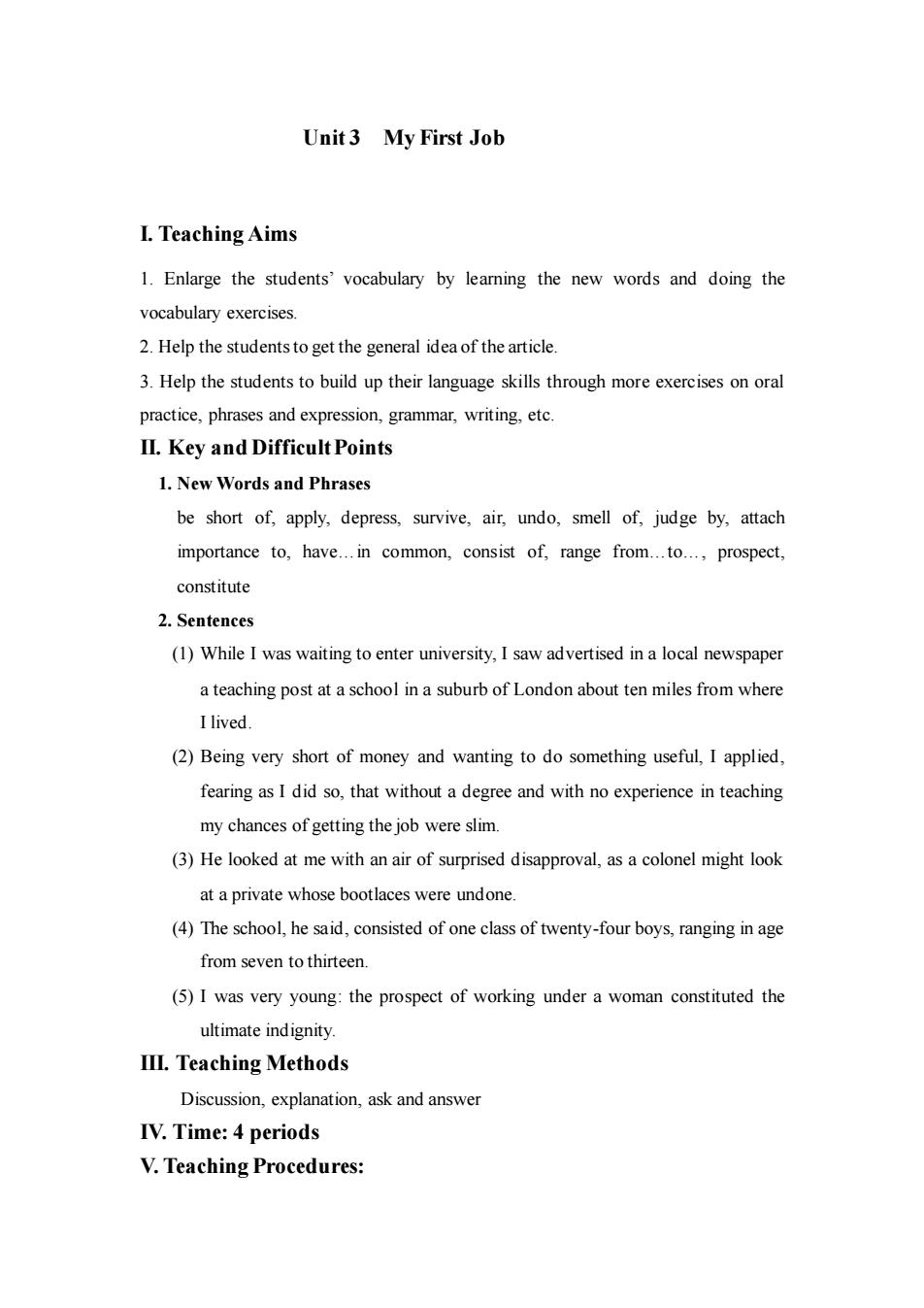
Unit3 My First Job I.Teaching Aims 1.Enlarge the students'vocabulary by learning the new words and doing the vocabulary exercises. 2.Help the studentsto get the general ideaof thearticle. 3.Help the students to build up their language skills through more exercises on oral practice,phrases and expression,grammar,writing,etc. II.Key and Difficult Points 1.New Words and Phrases be short of,apply,depress,survive,air,undo,smell of,judge by,attach importance to,have..in common,consist of,range from...to...prospect, constitute 2.Sentences (1)While I was waiting to enter university,I saw advertised in a local newspaper a teaching post at a school in a suburb of London about ten miles from where I lived. (2)Being very short of money and wanting to do something useful,I applied, fearing as I did so,that without a degree and with no experience in teaching my chances of getting the job were slim. (3)He looked at me with an air of surprised disapproval,as a colonel might look at a private whose bootlaces were undone (4)The school,he said,consisted of one class of twenty-four boys,ranging in age from seven to thirteen. (5)I was very young:the prospect of working under a woman constituted the ultimate indignity. III.Teaching Methods Discussion,explanation,ask and answer IV.Time:4 periods V.Teaching Procedures:
Unit 3 My First Job I. Teaching Aims 1. Enlarge the students’ vocabulary by learning the new words and doing the vocabulary exercises. 2. Help the students to get the general idea of the article. 3. Help the students to build up their language skills through more exercises on oral practice, phrases and expression, grammar, writing, etc. II. Key and Difficult Points 1. New Words and Phrases be short of, apply, depress, survive, air, undo, smell of, judge by, attach importance to, have…in common, consist of, range from…to…, prospect, constitute 2. Sentences (1) While I was waiting to enter university, I saw advertised in a local newspaper a teaching post at a school in a suburb of London about ten miles from where I lived. (2) Being very short of money and wanting to do something useful, I applied, fearing as I did so, that without a degree and with no experience in teaching my chances of getting the job were slim. (3) He looked at me with an air of surprised disapproval, as a colonel might look at a private whose bootlaces were undone. (4) The school, he said, consisted of one class of twenty-four boys, ranging in age from seven to thirteen. (5) I was very young: the prospect of working under a woman constituted the ultimate indignity. III. Teaching Methods Discussion, explanation, ask and answer IV. Time: 4 periods V. Teaching Procedures:
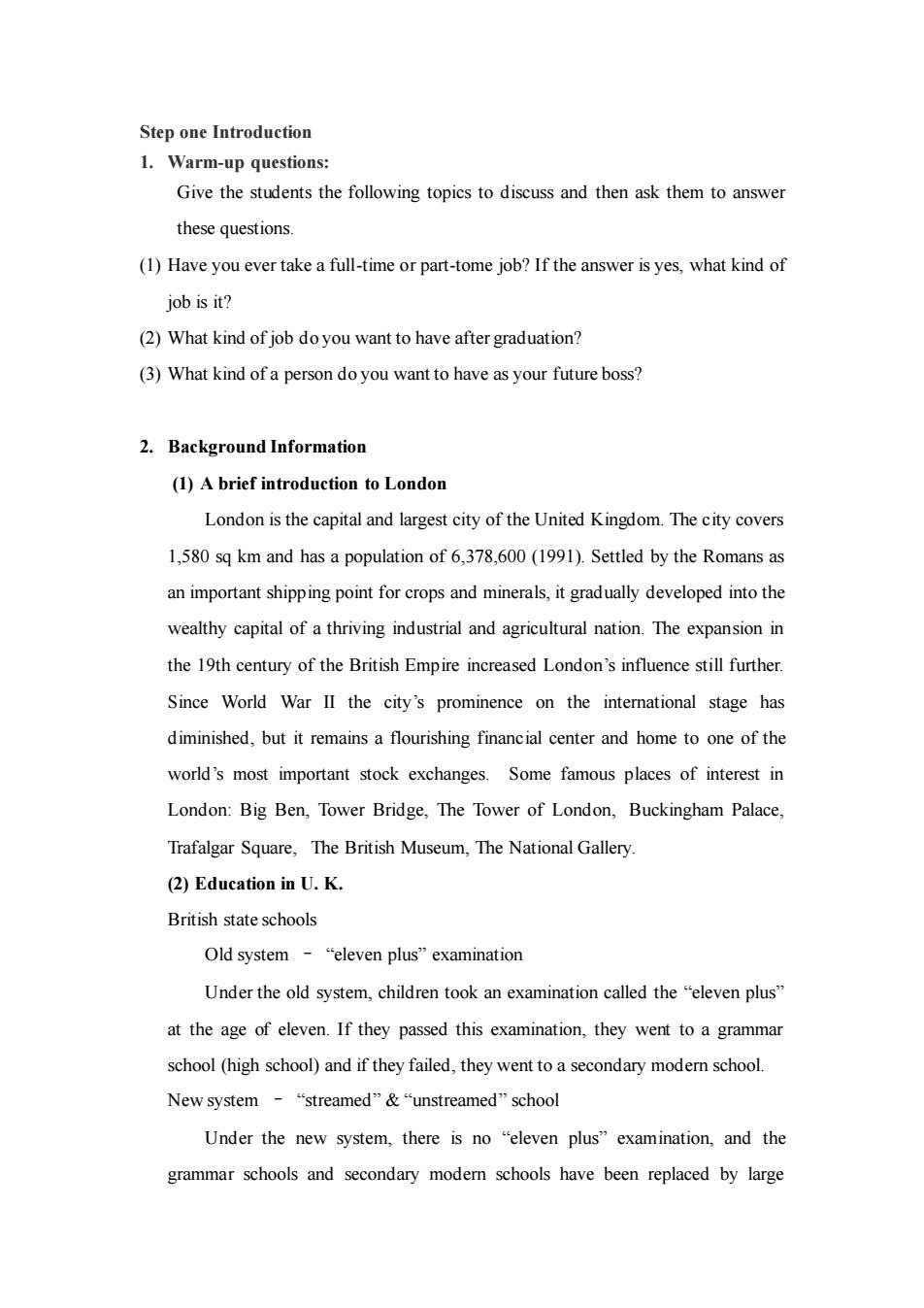
Step one Introduction 1.Warm-up questions Give the students the following topics to discuss and then ask them to answer these questions (1)Have you ever take a full-time or part-tome job?If the answer is yes,what kind of job is it? (2)What kind of job do you want to have after graduation? (3)What kind of a person do you want to have as your future boss? 2.Background Information (1)A brief introduction to London London is the capital and largest city of the United Kingdom.The city covers 1,580 sq km and has a population of 6,378,600(1991).Settled by the Romans as an important shipping point for crops and minerals,it gradually developed into the wealthy capital of a thriving industrial and agricultural nation.The expansion in the 19th century of the British Empire increased London's influence still further. Since World War II the city's prominence on the international stage has diminished,but it remains a flourishing financial center and home to one of the world's most important stock exchanges.Some famous places of interest in London:Big Ben,Tower Bridge,The Tower of London,Buckingham Palace, Trafalgar Square,The British Museum,The National Gallery. (2)Education in U.K. British state schools Old system-“eleven plus'”examination Under the old system,children took an examination called the "eleven plus" at the age of eleven.If they passed this examination,they went to a grammar school (high school)and if they failed,they went to a secondary modern school. New system-“streamed”&“unstreamed”school Under the new system.there is no "eleven plus"examination,and the grammar schools and secondary modem schools have been replaced by large
Step one Introduction 1. Warm-up questions: Give the students the following topics to discuss and then ask them to answer these questions. (1) Have you ever take a full-time or part-tome job? If the answer is yes, what kind of job is it? (2) What kind of job do you want to have after graduation? (3) What kind of a person do you want to have as your future boss? 2. Background Information (1) A brief introduction to London London is the capital and largest city of the United Kingdom. The city covers 1,580 sq km and has a population of 6,378,600 (1991). Settled by the Romans as an important shipping point for crops and minerals, it gradually developed into the wealthy capital of a thriving industrial and agricultural nation. The expansion in the 19th century of the British Empire increased London’s influence still further. Since World War II the city’s prominence on the international stage has diminished, but it remains a flourishing financial center and home to one of the world’s most important stock exchanges. Some famous places of interest in London: Big Ben, Tower Bridge, The Tower of London, Buckingham Palace, Trafalgar Square, The British Museum, The National Gallery. (2) Education in U. K. British state schools Old system – “eleven plus” examination Under the old system, children took an examination called the “eleven plus” at the age of eleven. If they passed this examination, they went to a grammar school (high school) and if they failed, they went to a secondary modern school. New system – “streamed” & “unstreamed” school Under the new system, there is no “eleven plus” examination, and the grammar schools and secondary modern schools have been replaced by large
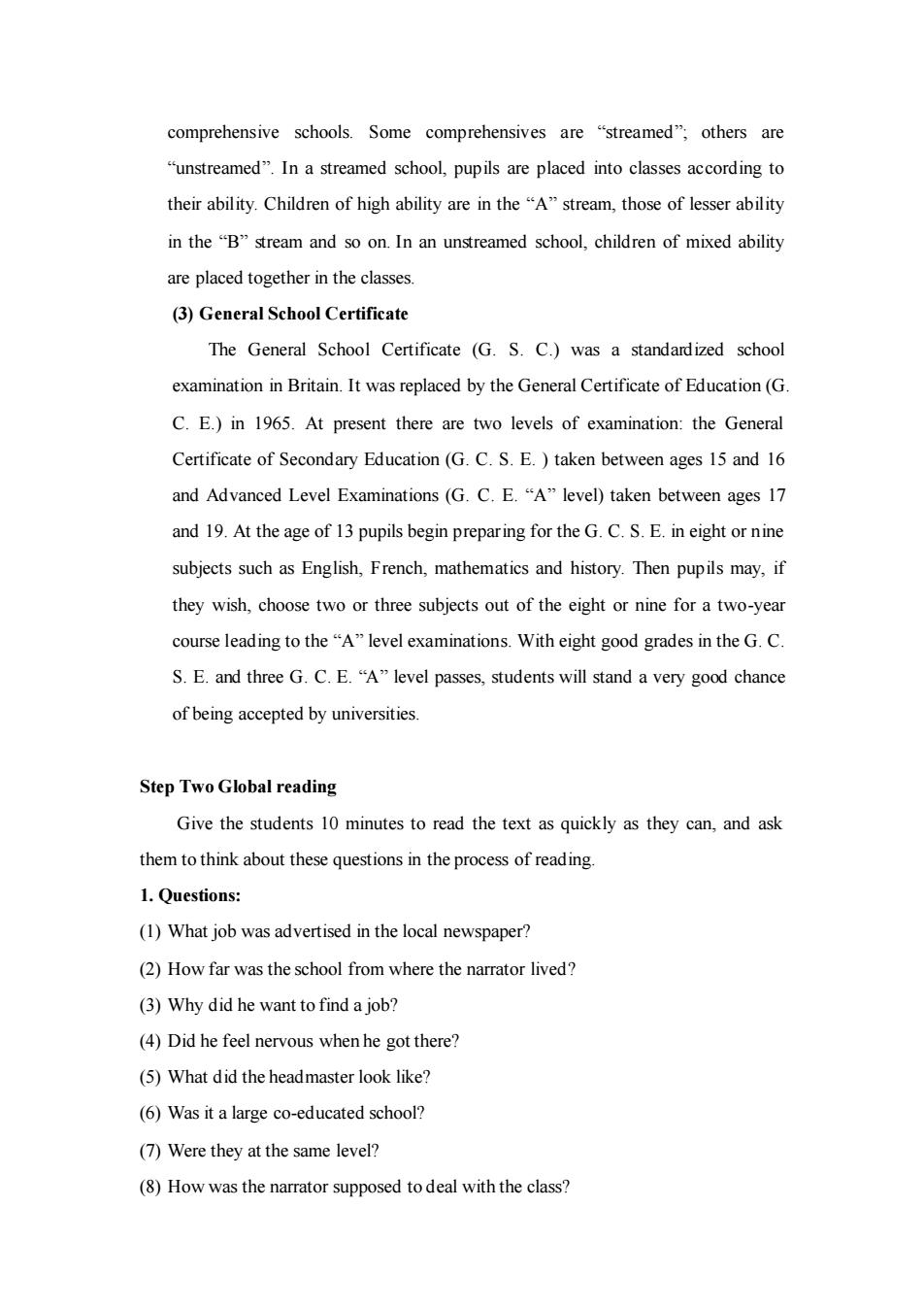
comprehensive schools.Some comprehensives are "streamed";others are "unstreamed".In a streamed school,pupils are placed into classes according to their ability.Children of high ability are in the"A"stream,those of lesser ability in the"B"stream and so on.In an unstreamed school,children of mixed ability are placed together in the classes. (3)General School Certificate The General School Certificate (G.S.C.)was a standardized school examination in Britain.It was replaced by the General Certificate of Education(G. C.E.)in 1965.At present there are two levels of examination:the General Certificate of Secondary Education(G.C.S.E.)taken between ages 15 and 16 and Advanced Level Examinations(G.C.E."A"level)taken between ages 17 and 19.At the age of 13 pupils begin preparing for the G.C.S.E.in eight or nine subjects such as English,French,mathematics and history.Then pupils may,if they wish.choose two or three subjects out of the eight or nine for a two-year course leading to the"A"level examinations.With eight good grades in the G.C. S.E.and three G.C.E."A"level passes,students will stand a very good chance of being accepted by universities Step Two Global reading Give the students 10 minutes to read the text as quickly as they can,and ask them to think about these questions in the process of reading 1.Questions: (1)What job was advertised in the local newspaper? (2)How far was the school from where the narrator lived? (3)Why did he want to find a job? (4)Did he feel nervous whenhe got there? (5)What did the headmaster look like? (6)Was it a large co-educated school? (7)Were they at the same level? (8)How was the narrator supposed to deal with the class?
comprehensive schools. Some comprehensives are “streamed”; others are “unstreamed”. In a streamed school, pupils are placed into classes according to their ability. Children of high ability are in the “A” stream, those of lesser ability in the “B” stream and so on. In an unstreamed school, children of mixed ability are placed together in the classes. (3) General School Certificate The General School Certificate (G. S. C.) was a standardized school examination in Britain. It was replaced by the General Certificate of Education (G. C. E.) in 1965. At present there are two levels of examination: the General Certificate of Secondary Education (G. C. S. E. ) taken between ages 15 and 16 and Advanced Level Examinations (G. C. E. “A” level) taken between ages 17 and 19. At the age of 13 pupils begin preparing for the G. C. S. E. in eight or nine subjects such as English, French, mathematics and history. Then pupils may, if they wish, choose two or three subjects out of the eight or nine for a two-year course leading to the “A” level examinations. With eight good grades in the G. C. S. E. and three G. C. E. “A” level passes, students will stand a very good chance of being accepted by universities. Step Two Global reading Give the students 10 minutes to read the text as quickly as they can, and ask them to think about these questions in the process of reading. 1. Questions: (1) What job was advertised in the local newspaper? (2) How far was the school from where the narrator lived? (3) Why did he want to find a job? (4) Did he feel nervous when he got there? (5) What did the headmaster look like? (6) Was it a large co-educated school? (7) Were they at the same level? (8) How was the narrator supposed to deal with the class?
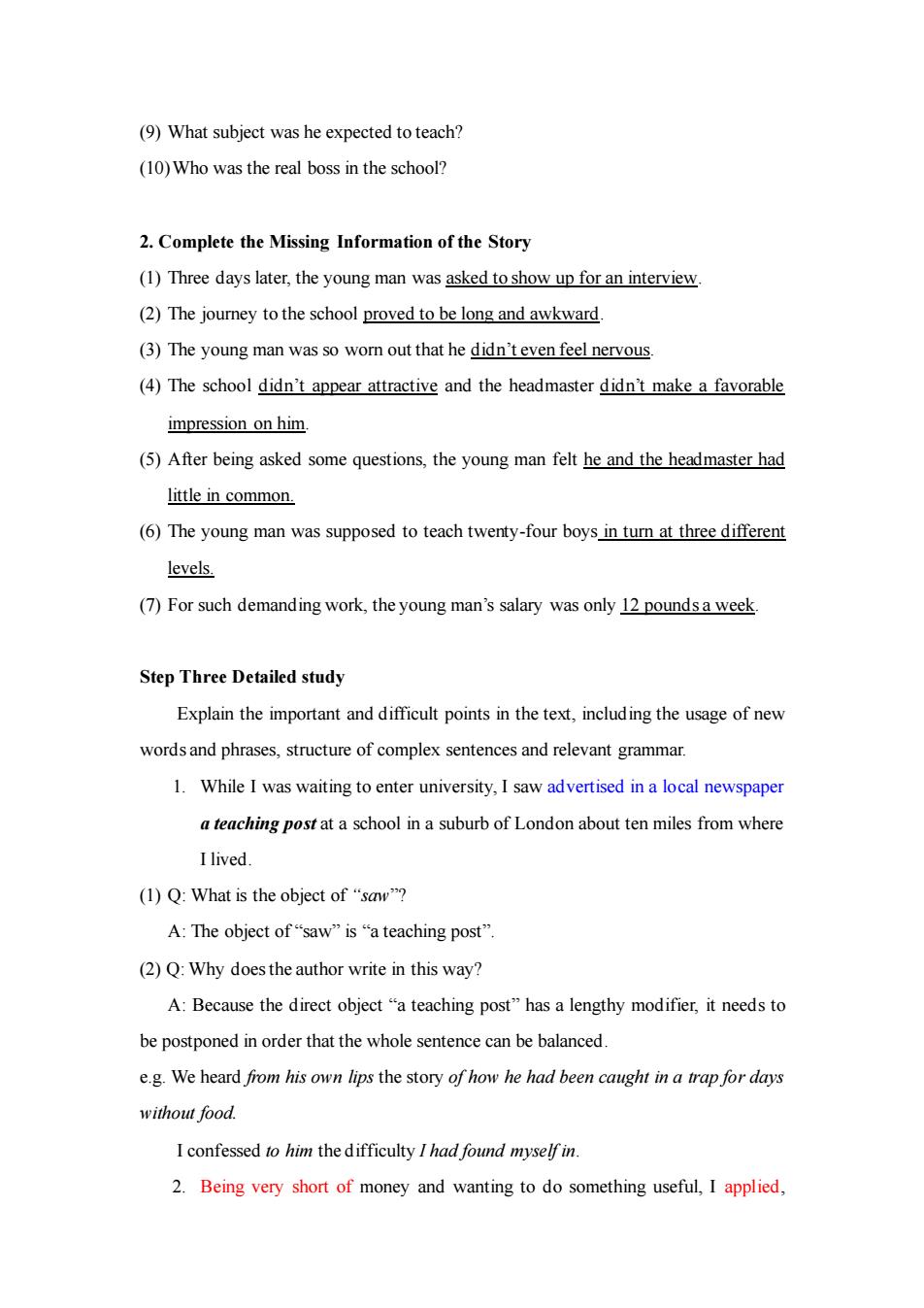
(9)What subject was he expected to teach? (10)Who was the real boss in the school? 2.Complete the Missing Information of the Story (1)Three days later,the young man was asked to show up for an interview. (2)The joumey to the school proved to be long and awkward (3)The young man was so wom out that he didn'teven feel nervous. (4)The school didn't appear attractive and the headmaster didn't make a favorable impression on him. (5)After being asked some questions,the young man felt he and the headmaster had little in common. (6)The young man was supposed to teach twenty-four boys in tum at three different levels. (7)For such demanding work,the young man's salary was only 12 poundsa week Step Three Detailed study Explain the important and difficult points in the text,including the usage of new words and phrases,structure of complex sentences and relevant grammar 1.While I was waiting to enter university,I saw advertised in a local newspaper a teaching post at a school in a suburb of London about ten miles from where I lived. (1)Q:What is the object of"sa? A:The object of“saw”is“a teaching post” (2)Q:Why does the author write in this way? A:Because the direct object"a teaching post"has a lengthy modifier,it needs to be postponed in order that the whole sentence can be balanced e.g.We heard from his own lips the story of how he had been caught in a trap for days without food. I confessed to him the difficulty I had found myself in 2.Being very short of money and wanting to do something useful,I applied
(9) What subject was he expected to teach? (10)Who was the real boss in the school? 2. Complete the Missing Information of the Story (1) Three days later, the young man was asked to show up for an interview. (2) The journey to the school proved to be long and awkward. (3) The young man was so worn out that he didn’t even feel nervous. (4) The school didn’t appear attractive and the headmaster didn’t make a favorable impression on him. (5) After being asked some questions, the young man felt he and the headmaster had little in common. (6) The young man was supposed to teach twenty-four boys in turn at three different levels. (7) For such demanding work, the young man’s salary was only 12 pounds a week. Step Three Detailed study Explain the important and difficult points in the text, including the usage of new words and phrases, structure of complex sentences and relevant grammar. 1. While I was waiting to enter university, I saw advertised in a local newspaper a teaching post at a school in a suburb of London about ten miles from where I lived. (1) Q: What is the object of “saw”? A: The object of “saw” is “a teaching post”. (2) Q: Why does the author write in this way? A: Because the direct object “a teaching post” has a lengthy modifier, it needs to be postponed in order that the whole sentence can be balanced. e.g. We heard from his own lips the story of how he had been caught in a trap for days without food. I confessed to him the difficulty I had found myself in. 2. Being very short of money and wanting to do something useful, I applied
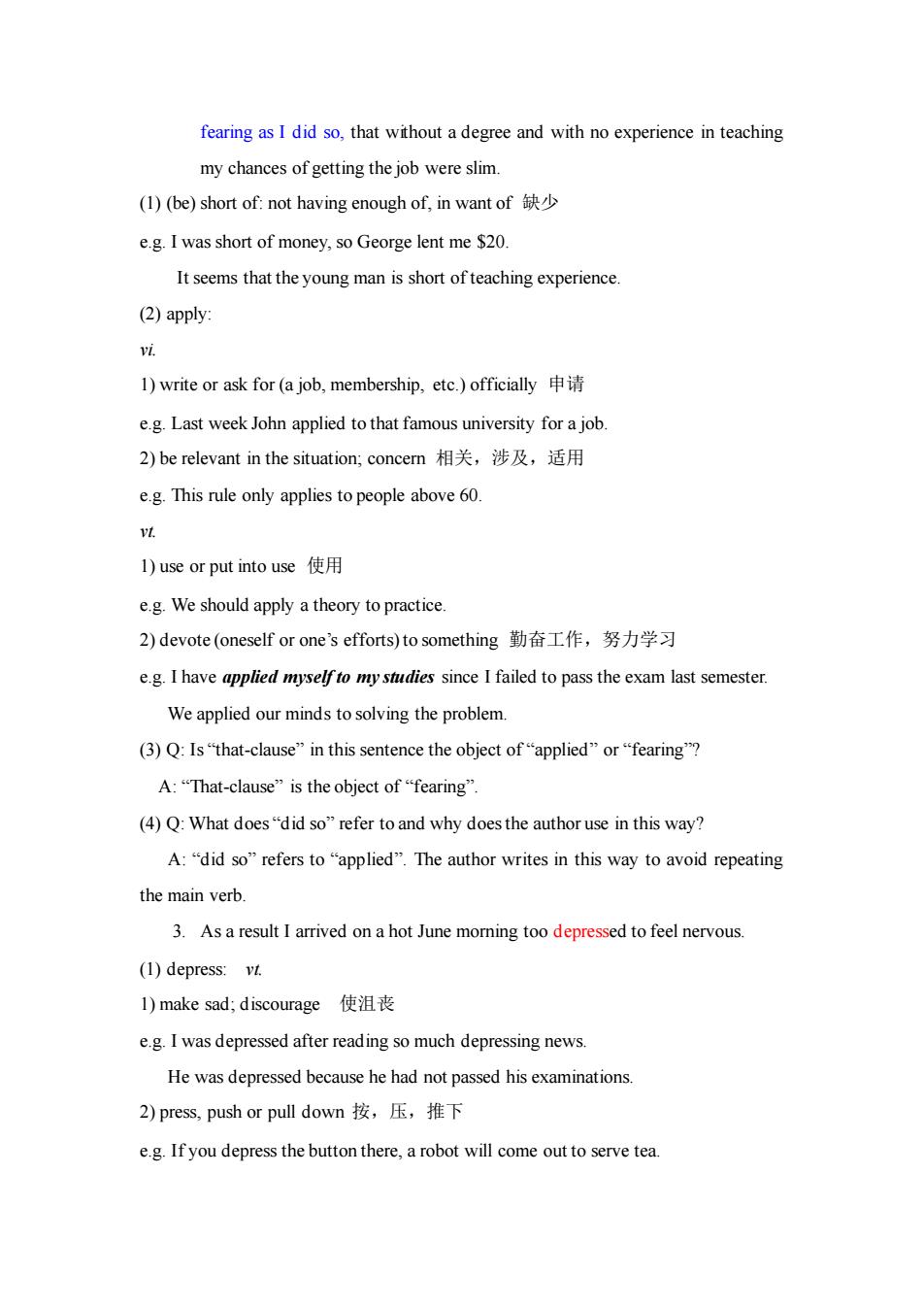
fearing as I did so,that without a degree and with no experience in teaching my chances of getting the job were slim. (1)(be)short of:not having enough of,in want of e.g.I was short of money,so George lent me $20. It seems that the young man is short of teaching experience. (2)apply: 1)write or ask for (a job,membership,etc.)officially e.g.Last week John applied to that famous university for a job. 2)be relevant in the situation;concem相关,涉及,适用 e.g.This rule only applies to people above 60. l)use or put into use使用 e.g.We should apply a theory to practice. 2)devote(oneself or one's efforts)to something勤奋工作,努力学习 e.g.I have applied myselfto mystudies since I failed to pass the exam last semester. We applied our minds to solving the problem (3)Q:Is"that-clause"in this sentence the object of"applied"or"fearing"? A:"That-clause”is the object of“fearing”. (4)Q:What does"did so"refer to and why does the authoruse in this way? A:"did so"refers to"applied".The author writes in this way to avoid repeating the main verb. 3.Asa result I arrived on a hot June moming too depressed to feel nervous. (1)depress:vL I)make sad,discourage使沮丧 e.g.I was depressed after reading so much depressing news. He was depressed because he had not passed his examinations. 2)press,.push or pull down按,压,推下 e.g.If you depress the button there,a robot will come out to serve tea
fearing as I did so, that without a degree and with no experience in teaching my chances of getting the job were slim. (1) (be) short of: not having enough of, in want of 缺少 e.g. I was short of money, so George lent me $20. It seems that the young man is short of teaching experience. (2) apply: vi. 1) write or ask for (a job, membership, etc.) officially 申请 e.g. Last week John applied to that famous university for a job. 2) be relevant in the situation; concern 相关,涉及,适用 e.g. This rule only applies to people above 60. vt. 1) use or put into use 使用 e.g. We should apply a theory to practice. 2) devote (oneself or one’s efforts) to something 勤奋工作,努力学习 e.g. I have applied myself to my studies since I failed to pass the exam last semester. We applied our minds to solving the problem. (3) Q: Is “that-clause” in this sentence the object of “applied” or “fearing”? A: “That-clause” is the object of “fearing”. (4) Q: What does “did so” refer to and why does the author use in this way? A: “did so” refers to “applied”. The author writes in this way to avoid repeating the main verb. 3. As a result I arrived on a hot June morning too depressed to feel nervous. (1) depress: vt. 1) make sad; discourage 使沮丧 e.g. I was depressed after reading so much depressing news. He was depressed because he had not passed his examinations. 2) press, push or pull down 按,压,推下 e.g. If you depress the button there, a robot will come out to serve tea